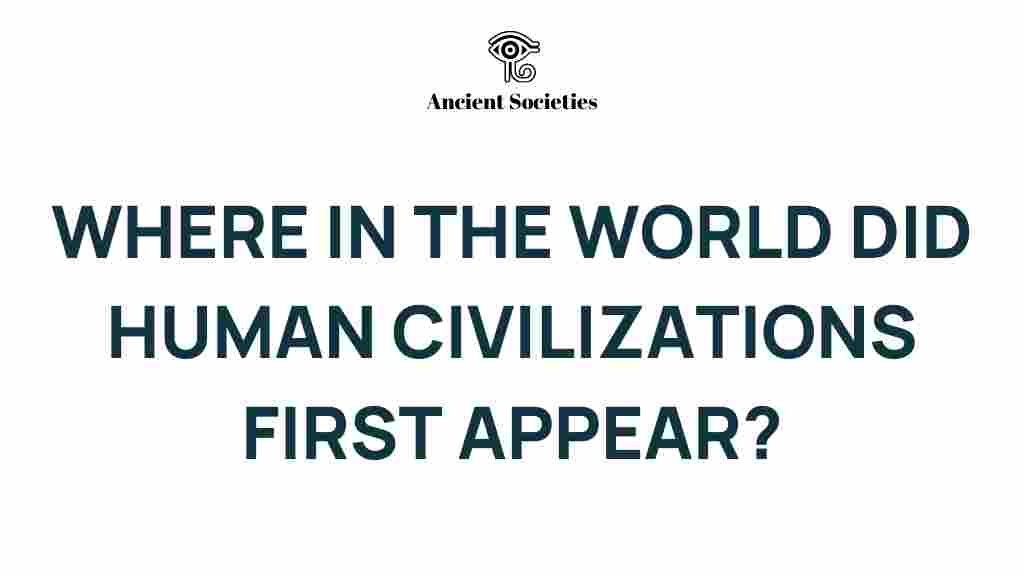Unearthing the Origins: Where Did Human Civilizations Begin?
The story of human civilizations is not merely a timeline of dates and events; it is a profound narrative of cultural development that stretches back thousands of years. Understanding the origins of these early societies provides insight into how human beings transitioned from small, nomadic groups to complex civilizations. This article explores the archaeological findings and historical context that reveal the beginnings of human civilizations, highlighting key regions, significant cultures, and the transformative Neolithic period.
The Dawn of Human Civilizations
To fully grasp the origins of human civilizations, we need to delve into the prehistoric era. Before the advent of agriculture, humans lived as hunter-gatherers, relying on the natural environment for sustenance. This lifestyle defined the early human experience until the Neolithic Revolution changed everything.
- Hunter-Gatherer Societies: Small, mobile groups that foraged for food.
- Neolithic Revolution: The shift to agriculture around 10,000 BC, leading to settled communities.
- Emergence of Complex Societies: With agriculture came the ability to support larger populations.
The Neolithic Revolution and Its Impact
The Neolithic period marked a turning point in human history, as people began to domesticate plants and animals. This shift enabled the development of permanent settlements, which laid the groundwork for the first human civilizations.
Key aspects of the Neolithic Revolution include:
- **Agriculture**: The cultivation of crops such as wheat and barley.
- **Animal Husbandry**: The domestication of animals like sheep, goats, and cattle.
- **Settlement**: Establishing permanent villages, leading to population growth.
- **Social Structures**: The development of social hierarchies and division of labor.
Mesopotamia: The Cradle of Civilization
Often referred to as the “Cradle of Civilization,” Mesopotamia is one of the earliest regions where human civilizations emerged. Situated between the Tigris and Euphrates rivers, this area witnessed the rise of complex societies around 3500 BC.
Significant contributions from Mesopotamian civilizations include:
- Writing Systems: The invention of cuneiform writing by the Sumerians.
- Urbanization: The establishment of city-states like Ur and Babylon.
- Commerce: Development of trade networks that facilitated cultural exchange.
- Legal Codes: The formulation of laws, exemplified by the Code of Hammurabi.
Ancient Cultures Beyond Mesopotamia
While Mesopotamia is often highlighted, other ancient cultures also played pivotal roles in the development of human civilizations. These include:
1. Ancient Egypt
Located along the Nile River, Ancient Egypt contributed significantly to human history with its impressive architectural feats, such as the pyramids, and its advancements in writing, religion, and governance.
2. The Indus Valley Civilization
Flourishing around 2500 BC, the Indus Valley civilization showcased sophisticated urban planning with cities like Harappa and Mohenjo-Daro, known for their advanced drainage systems and standardized weights and measures.
3. The Yellow River Civilization
In China, the early societies that arose along the Yellow River, such as the Xia and Shang dynasties, laid the foundations for Chinese civilization, contributing innovations in agriculture, metallurgy, and writing.
Archaeological Discoveries and Cultural Development
The study of archaeology has been instrumental in uncovering the origins of human civilizations. Excavations at ancient sites have provided valuable insights into the daily lives, social structures, and cultural practices of early societies.
Some notable archaeological discoveries include:
- Göbekli Tepe: A monumental site in Turkey dating back to around 9600 BC, suggesting that complex rituals preceded settled farming.
- Stonehenge: A prehistoric monument in England that demonstrates sophisticated engineering and social organization.
- Çatalhöyük: An ancient settlement in Turkey that reveals aspects of communal living and art in Neolithic societies.
The Role of Trade in Early Societies
Trade played a crucial role in the cultural development of early civilizations. As societies became more complex, the exchange of goods, ideas, and technologies facilitated interactions between different cultures.
Key features of trade in early societies include:
- Resource Distribution: Access to materials not available locally, such as metals and spices.
- Cultural Exchange: The sharing of religious beliefs, artistic styles, and technological innovations.
- Economic Systems: The emergence of market practices and trade routes, such as the Silk Road.
Challenges and Troubleshooting Early Societies Faced
As human civilizations developed, they encountered various challenges that tested their resilience and adaptability. Addressing these challenges was crucial for their survival and growth.
1. Environmental Changes
Shifts in climate and geography could lead to agricultural failures or resource shortages. Societies had to innovate agricultural techniques, such as irrigation, to cope with these changes.
2. Conflict and Warfare
As societies grew, so did competition for resources. Many early civilizations faced internal strife or conflicts with neighboring groups, leading to the need for organized military structures.
3. Social Inequality
The development of social hierarchies often led to disparities in wealth and power, creating tensions within societies. Addressing social inequality was a significant challenge that influenced political structures.
Conclusion: The Legacy of Human Civilizations
The origins of human civilizations are a testament to humanity’s ingenuity and adaptability. From the early hunter-gatherer societies to the complex urban centers of Mesopotamia and beyond, the journey of human civilizations is rich and varied. Through archaeology, we continue to unearth the past, revealing the intricate tapestry of cultures that have shaped our world.
As we look to the future, understanding these origins can provide valuable lessons about cooperation, resilience, and the importance of cultural exchange. For further exploration of human history, you can visit this resource which delves deeper into ancient cultures and their impact on modern society.
In summary, the origins of human civilizations are a fascinating subject that encapsulates the essence of cultural development, the significance of early societies, and the enduring impact of our ancestors on contemporary life.
This article is in the category Archaeology and created by AncientSocieties Team
